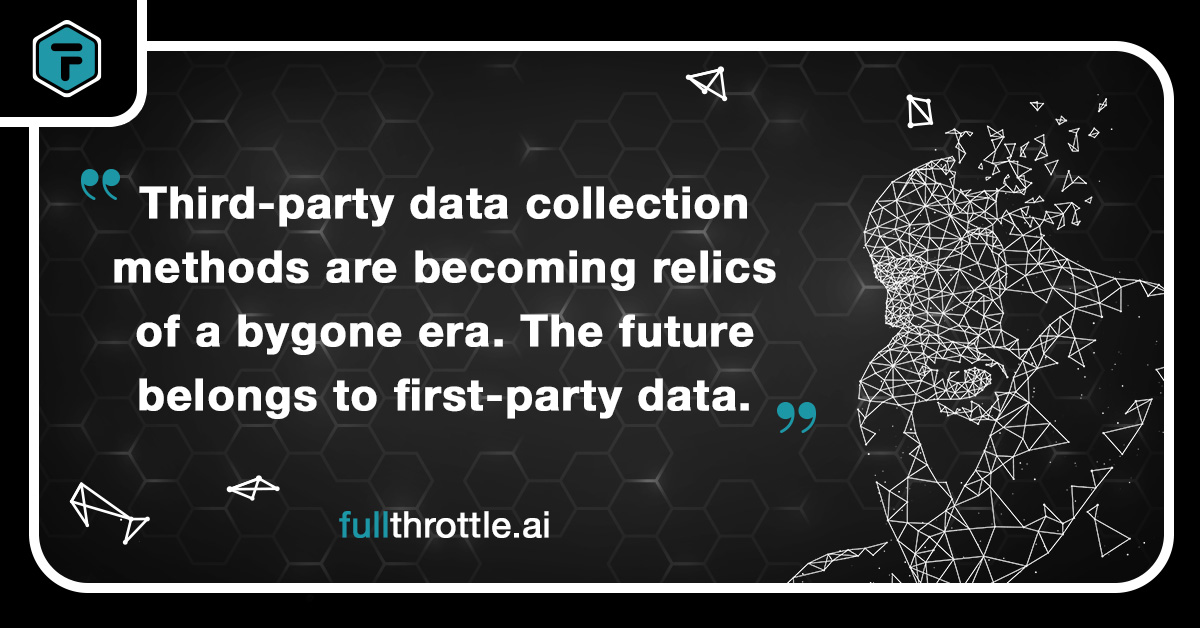
Even More Data Privacy Laws Passed Than Expected.
In recent years, there's been a global shift towards data privacy, with the United States hot on the trail of the European Union’s stringent approach. The transition isn't just happening in legislative chambers, either; data privacy laws aside, it's a topic that's increasingly resonant with the public. More consumers are voicing their discomfort with personal data being bartered and shared without their explicit consent.
Google, acknowledging these changing tides, has begun to phase out cookies for some users. Apple has already done so. It points to a broader industry trend: a pivot away from traditional data collection methods and toward more privacy-conscious approaches.
Key Takeaways:
- The acceleration of comprehensive privacy legislation in 2023 across multiple U.S. states signifies an urgent need for businesses to shift towards privacy-first, first-party data collection methods.
- Traditional third-party data collection methods, including cookie-based tracking, are becoming increasingly obsolete and non-compliant with the new privacy standards.
- fullthrottle.aiTM offers a pioneering solution that aligns with these privacy laws, using patented technology to harness first-party data for more effective and compliant marketing strategies.
Comprehensive Privacy Legislation in 2023
2023 has marked a significant year in the advancement of comprehensive data privacy laws in the United States. (We made a page breaking them all down here.) Comprehensive privacy laws are those that provide a broad framework for data privacy, offering substantial protections for consumer data across various sectors.
The IAPP's US State Privacy Legislation Tracker lists the states that enacted comprehensive privacy laws in 2023:
- California: California Privacy Rights Act
- Colorado: Colorado Privacy Act
- Connecticut: Connecticut Personal Data Privacy and Online Monitoring Act
- Delaware: Delaware Personal Data Privacy Act
- Indiana: Indiana Consumer Data Protection Act
- Iowa: Iowa Consumer Data Protection Act
- Montana: Montana Consumer Data Privacy Act
- New Jersey: SB 332
- Oregon: Oregon Consumer Privacy Act
- Tennessee: Tennessee Information Protection Act
- Texas: Texas Data Privacy and Security Act
- Utah: Utah Consumer Privacy Act
- Virginia: Virginia Consumer Data Protection Act
This list, while not exhaustive, highlights the significant strides made in privacy legislation across the U.S. in 2023. The maximum grace period given to companies operating in these states is two years, with Indiana’s Consumer Data Protection Act taking effect on January 1, 2026. Suffice to say: the clock is ticking.
How Your Brand Can Adapt
The hard truth is that third-party data collection methods are becoming relics of a bygone era. The future belongs to first-party data which is gathered directly from consumers with their consent. This shift is not just about compliance with new laws; it's about building trust with your audience by respecting their privacy choices.
The key is to avoid traditional pitfalls like purchasing leads or relying on AdTech solutions that claim to be "cookieless" but still engage in covert forms of third-party data collection, such as IP tracking or using mobile ad IDs. Those practices, while legally compliant, are on borrowed time. The main problem lies in how they collect data without the user’s explicit consent — opt-out rather than opt-in. The spirit of privacy legislation circles around informed consent. That means IP tracking and other non-cookie-but-still-third-party data collection (rolls off the tongue, eh?) will be next on the chopping block.
Businesses need to rethink their strategies to ensure they're not just compliant with these privacy laws, but are also genuinely respecting their customers' privacy. This means embracing transparent, opt-in methods for data collection and focusing on building relationships with customers based on trust and respect.
The Whole Package: fullthrottle.aiTM
fullthrottle.aiTM stands at the forefront of this new era, combining marketing effectiveness with a privacy-first approach. At the heart of fullthrottle.ai’s strategy is the use of first-party data, gathered directly from website visitors who choose to opt in to location tracking. This approach not only aligns with all US privacy legislation, but also with the growing consumer demand for transparency and respect for personal data, setting your brand up for years to come.
Powered by patented technology, fullthrottle.aiTM transforms first-party data into actionable insights, enabling businesses to connect with their audience more effectively than traditional, cookie-based tracking methods. We know first party data wouldn’t amount to much if it traded compliance for effectiveness. Thankfully, you won’t have to choose one or the other — our platform will also dramatically enhance your marketing efforts.
The fullthrottle.aiTM platform generates net-new, in-market leads who are actively engaged on your website. By messaging to the entire household, fullthrottle.aiTM increases conversion rates, returning visitors, and cart values.
One of the most groundbreaking aspects of fullthrottle.aiTM is its ability to measure the impact of each marketing message back to actual transactions, offering a clear view of how marketing efforts translate into tangible business outcomes.
In an era where data privacy is paramount, fullthrottle.aiTM ensures that businesses don't just adapt to the new norms but thrive in them. By leveraging robust, consent-based data, we offer a solution that is superior in driving meaningful engagement and business growth.


